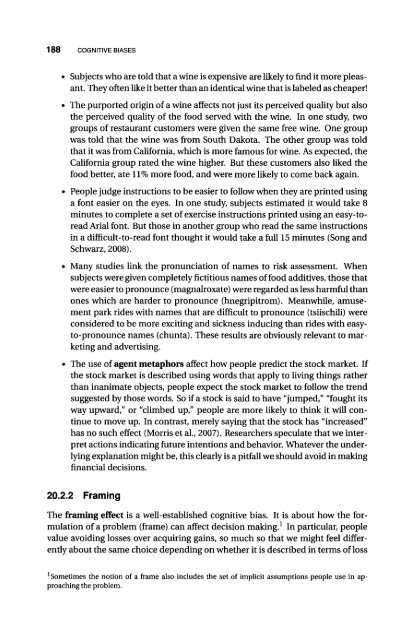An Introduction to Critical Thinking and Creativity - always yours
An Introduction to Critical Thinking and Creativity - always yours
An Introduction to Critical Thinking and Creativity - always yours
Create successful ePaper yourself
Turn your PDF publications into a flip-book with our unique Google optimized e-Paper software.
188 COGNITIVE BIASES<br />
• Subjects who are <strong>to</strong>ld that a wine is expensive are likely <strong>to</strong> find it more pleasant.<br />
They often like it better than an identical wine that is labeled as cheaper!<br />
• The purported origin of a wine affects not just its perceived quality but also<br />
the perceived quality of the food served with the wine. In one study, two<br />
groups of restaurant cus<strong>to</strong>mers were given the same free wine. One group<br />
was <strong>to</strong>ld that the wine was from South Dakota. The other group was <strong>to</strong>ld<br />
that it was from California, which is more famous for wine. As expected, the<br />
California group rated the wine higher. But these cus<strong>to</strong>mers also liked the<br />
food better, ate 11% more food, <strong>and</strong> were more likely <strong>to</strong> come back again.<br />
• People judge instructions <strong>to</strong> be easier <strong>to</strong> follow when they are printed using<br />
a font easier on the eyes. In one study, subjects estimated it would take 8<br />
minutes <strong>to</strong> complete a set of exercise instructions printed using an easy-<strong>to</strong>read<br />
Arial font. But those in another group who read the same instructions<br />
in a difficult-<strong>to</strong>-read font thought it would take a full 15 minutes (Song <strong>and</strong><br />
Schwarz, 2008).<br />
• Many studies link the pronunciation of names <strong>to</strong> risk assessment. When<br />
subjects were given completely fictitious names of food additives, those that<br />
were easier <strong>to</strong> pronounce (magnalroxate) were regarded as less harmful than<br />
ones which are harder <strong>to</strong> pronounce (hnegripitrom). Meanwhile, amusement<br />
park rides with names that are difficult <strong>to</strong> pronounce (tsiischili) were<br />
considered <strong>to</strong> be more exciting <strong>and</strong> sickness inducing than rides with easy<strong>to</strong>-pronounce<br />
names (chunta). These results are obviously relevant <strong>to</strong> marketing<br />
<strong>and</strong> advertising.<br />
• The use of agent metaphors affect how people predict the s<strong>to</strong>ck market. If<br />
the s<strong>to</strong>ck market is described using words that apply <strong>to</strong> living things rather<br />
than inanimate objects, people expect the s<strong>to</strong>ck market <strong>to</strong> follow the trend<br />
suggested by those words. So if a s<strong>to</strong>ck is said <strong>to</strong> have "jumped," "fought its<br />
way upward," or "climbed up," people are more likely <strong>to</strong> think it will continue<br />
<strong>to</strong> move up. In contrast, merely saying that the s<strong>to</strong>ck has "increased"<br />
has no such effect (Morris et al., 2007). Researchers speculate that we interpret<br />
actions indicating future intentions <strong>and</strong> behavior. Whatever the underlying<br />
explanation might be, this clearly is a pitfall we should avoid in making<br />
financial decisions.<br />
20.2.2 Framing<br />
The framing effect is a well-established cognitive bias. It is about how the formulation<br />
of a problem (frame) can affect decision making. 1 In particular, people<br />
value avoiding losses over acquiring gains, so much so that we might feel differently<br />
about the same choice depending on whether it is described in terms of loss<br />
Sometimes the notion of a frame also includes the set of implicit assumptions people use in approaching<br />
the problem.
















